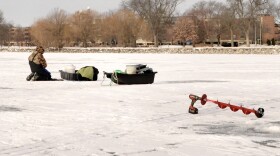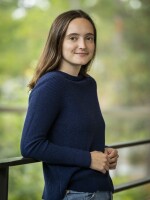The future of a northern Michigan environmental education program for children is in doubt after the Trump administration froze federal funding for education grants across the country.
That could have a direct impact on childcare in rural parts of the region.
The nonprofit SEEDS Ecology & Education Centers runs a program called Ecoschool, which offers summer camps and after-school programs in twelve northern Michigan schools in rural areas. The costs are reimbursed by the federal Title IV Part B program and distributed by a Michigan agency called MiLEAP.
The funds were supposed to be released on July 1, but never arrived.
In some local elementary schools, the SEEDS program is one of very few after-school childcare options, and sometimes the only free option for parents. It's focused on environmental education, offering homework help and taking kids out into nature.
'Less and less community' at rural schools
“It’s going to be a huge loss,” said Cody Jensen, principal of Kaleva Norman Dickson Elementary School.
“[SEEDS] takes them places that a lot of the kids may not ever go to or experience without having that program,” he said. “They go sailing, they go to Sleeping Bear Dunes … [they] go fishing with them and hiking and learn about the different trees and all that good stuff.”
Jensen said 30 to 40 of the school’s 250 students have been enrolled in the program. Besides SEEDS, the school has some sports programs and weekly after-school clubs run by teachers. But those options are not as consistent as the SEEDS program, where the instructor often stays until 6 p.m. as parents collect their kids after work. Jensen has tried to get 4H into the school, but it’s often hard to find volunteers.
“Our school is a hub for the community,” he explained. “So with churches having low attendance and us not having as many after-school clubs … it just creates less and less community. I mean, what are these kids going to be doing after school now?”
Crisis for SEEDS
Sarna Salzman, SEEDS' executive director, said the organization is "in emergency planning mode."
The federal funding freeze impacts programs in 12 rural schools, from Kaleva to Kalkaska.
The grants are distributed through reimbursements, so SEEDS must now decide whether to pay for programs without knowing if it will be paid back.
“We held an emergency meeting and decided to finish the summer camp season as planned, because we did not want to leave the parents, the families and the students hanging,” Salzman said. “But as we head into the fall, I don't know exactly what's going to happen yet.”
For now, the funding is on pause but has not been cancelled.
But after a Supreme Court ruling this week, the federal Department of Education that ran the grant may be entirely dismantled.
On Monday, Michigan joined a coalition of 24 states and the District of Columbia suing the federal government for freezing education funding already appropriated by Congress, including for summer and after-school programs.
The Department of Education did not respond to IPR’s request for comment. However, according to the States Newsroom, a spokesperson for the Office of Management and Budget said in a statement that “these grant programs have been grossly misused to subsidize a radical leftwing agenda.”
SEEDS is currently raising money to support the programming in place of the federal grant, which would have given them $5,665,000 through 2029.
“We have a child care crisis on our hands statewide. In these really rural communities, there [are] even fewer resources,” Salzman said. “Some of these areas just don't really have any other options for childcare at all, paid for, let alone free.”







